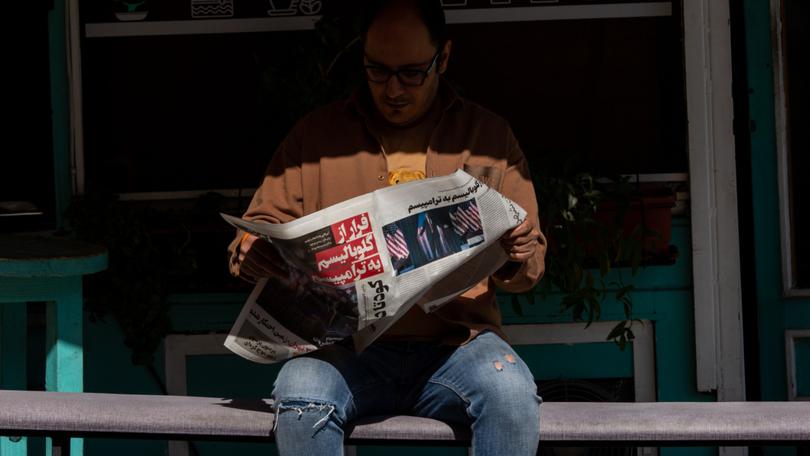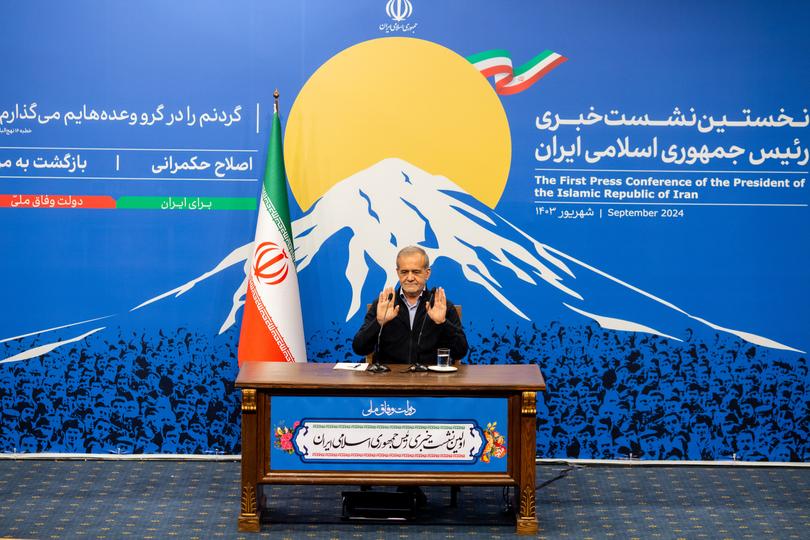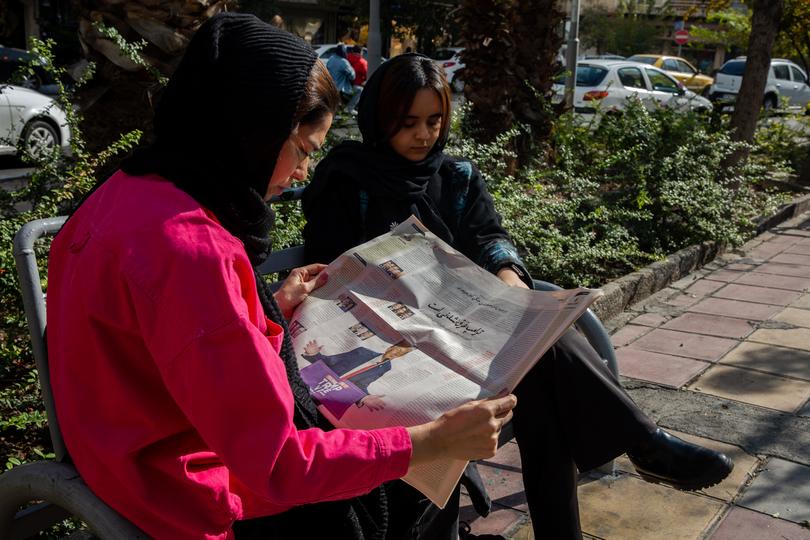THE NEW YORK TIMES: Iran debates whether it could make a deal with Donald Trump
THE NEW YORK TIMES: Despite a charged history, many former officials, pundits and newspaper editorials in Iran have openly called for the government to engage with Donald Trump in the week since his reelection.

President Donald Trump pulled out of the 2015 nuclear pact between Iran and world powers, imposed tough economic sanctions on Iran and ordered the killing of its top general. And Iran, federal prosecutors said Friday, plotted to assassinate Trump before November’s election.
Yet despite that charged history, many former officials, pundits and newspaper editorials in Iran have openly called for the government to engage with Trump in the week since his reelection. Shargh, the main reformist daily newspaper, said in a front-page editorial that Iran’s new, more moderate president, Masoud Pezeshkian, must “avoid past mistakes and assume a pragmatic and multidimensional policy.”
And many in Pezeshkian’s government agree, according to five Iranian officials who asked that their names not be published because they were not authorized to discuss government policy. They say Trump loves to make deals where others have failed, and that his outsize dominance in the Republican Party could give any potential agreement more staying power. That might give an opening for some kind of lasting deal with the United States, they argue.
Sign up to The Nightly's newsletters.
Get the first look at the digital newspaper, curated daily stories and breaking headlines delivered to your inbox.
By continuing you agree to our Terms and Privacy Policy.“Do not lose this historic opportunity for change in Iran-U.S. relations,” wrote a prominent politician and former political adviser to Iran’s government, Hamid Aboutalebi, in an open letter to Iran’s president. He advised Pezeshkian to congratulate Trump on winning the election and set a new tone for a pragmatic and forward-looking policy.
Still, critical decisions in Iran are made by the supreme leader, Ayatollah Ali Khamenei, and he banned negotiations with Trump during his first term. In Iran’s factional politics, even if Pezeshkian wanted to negotiate with Trump, he would have to get Khamenei’s approval.
And many conservatives, including some in the powerful Revolutionary Guard, oppose any engagement with Trump. The U.S. Justice Department has said that Iran’s Revolutionary Guard hacked Trump’s campaign computers and spread disinformation online in an attempt to influence the presidential election. On Friday, federal prosecutors in Manhattan revealed an effort by Iran to assassinate Trump.

Iran’s foreign minister, Abbas Araghchi, called those charges a “fabricated” scenario in a post on the social platform X on Saturday. He said Iran respected the American people’s choice in electing their president, and that the path forward for Iran and the U.S. begins with mutual “respect” and “confidence building.”
Reza Salehi, a conservative analyst in Tehran, Iran, close to the country’s hard-line political faction, said in an interview that negotiation with Trump would be politically challenging for Iran’s new government. Conservatives have already voiced their disapproval, saying any engagement would be a betrayal of Gen. Qassem Soleimani, whose assassination Trump ordered in 2020.
Hamshahri, a conservative newspaper run by Tehran’s municipal government, ran front page photos of Trump in an orange jumpsuit and handcuffs with the headline: “The return of the killer.” Still, even Salehi said: “I’m going to go against this position and say that Trump will benefit Iran compared to his predecessor.” He added: “He is into making deals; he is into ending wars and against starting new ones.”
Even those who want to engage with Trump say the country’s foreign policy for a Trump era will largely depend on how Trump approaches Iran and the Middle East, as well as who he selects for his administration, according to the five officials. Trump recently said he does not seek to harm Iran, and his main demand was that the country not develop nuclear weapons. But at another point during the campaign, he appeared to give Israel a green light to bomb Iran’s nuclear sites. He said Israel should “hit the nuclear first and worry about the rest later.”
And on Sunday in a video statement, Israeli Prime Minister Benjamin Netanyahu said he had spoken to Trump and “we see eye-to-eye on the Iranian threat in all its aspects, and on the dangers they reflect.”
Brian Hook, who served as a representative for Iran during the first Trump administration, told CNN on Thursday that Trump “has no interest in regime change,” but he also “understands that the chief driver of instability in the Middle East is the Iranian regime.”
One of the first decisions that Iran must make is whether to follow though on promises to launch a massive revenge attack on Israel. Last month, Israel struck missile bases and air defense systems around Iran’s critical energy sites after Iran launched a wave of ballistic missiles at Israel to avenge the killing of several senior commanders and top regional allies.

Trump has been a staunch supporter of Israel. A potential war between Iran and Israel could quickly escalate tensions with an incoming Trump administration and derail any chances of better relations.
The five Iranian officials said many of Trump’s stated foreign policy goals — ending the wars in the Gaza Strip and Lebanon, ending the war in Ukraine and an “America First” agenda — appeal to Iran.
Ending the wars in Gaza and Lebanon could help avert a wider war between Israel and Iran, which supports Hamas in Gaza and Hezbollah in Lebanon. Ending the war in Ukraine could take pressure off Iran for supplying weapons to Russia. And Trump’s domestic policy could mean less interest in other countries’ affairs.
Mohammad Javad Zarif, the former foreign minister and current vice president for strategic affairs in Iran, said in a statement on X that he hopes Trump and Vice President-elect JD Vance would “stand against war as pledged, and will heed the clear lesson given by the American electorate to end wars and prevent new ones.”
Mohammad Ali Abtahi, a former vice president, said in an interview from Tehran that his advice would be “to turn the threat of Trump into a good opportunity and start active diplomacy.”
“Trump likes to take personal credit for resolving a crisis, and one of the main crises now is the one between Iran and the America,” he said.
Two competing strategies are being discussed in Iran’s policy circles, Abtahi said. One calls for Iran to proceed defiantly and strengthen its proxy militias in the Middle East to deter the United States and Israel. The other calls for negotiating with Trump, which is gaining traction among some conservatives, largely because they don’t see an alternative for resolving Iran’s economic problems.
For more than two decades, Iran’s diplomacy with the United States has been predicated on the American political party in office, loosely centered on the idea that Republicans are more hostile to diplomacy while Democrats are more open to it.
Iran refused to engage with Trump after he imposed a “maximum pressure” campaign against Tehran during his first term. The country bided its time, hoping the next Democratic administration would lift sanctions and return to the nuclear deal that Trump had abandoned.
Those moves never materialized. The Biden administration and Iran never returned to the deal, and sanctions remained in place.
The five Iranian officials familiar with Iran’s foreign policy planning, two of them from the Foreign Ministry, said the country’s experience with the Biden administration was frustrating and led many to conclude that a deal with a Republican administration would yield longer-lasting results.
The two officials from the Foreign Ministry said Iran has been preparing for a potential Trump presidency for months, with the ministry creating an informal working group on the topic as far back as March.
Pezeshkian has acknowledged that any hope for economic relief is tied to improving relations with the West.
“For us, it does not matter who has won the election in America because we rely on our own internal strength,” Pezeshkian said Wednesday, according to Iranian media reports. At the same time, “we will not have a limited and closed outlook in developing our relations with countries,” he added.
Analysts in Iran and the United States said Trump would most likely require Iran to stop arming and funding the militant groups fighting Israel as part of any deal to lift sanctions. Khamenei has repeatedly said Iran’s support for those groups will continue.
Rahman Ghahremanpour, an analyst in Tehran, said Iran does not have many options. Maintaining the status quo for another four years is not tenable. The economy is tanking under sanctions and mismanagement, inflation is skyrocketing and domestic discontent remains high.
“We do not want more sanctions and more instability,” Ghahremanpour said. “But at the same time, a comprehensive deal with Trump has to give us some wiggle room to save face domestically and justify it. That will be the big challenge.”
This article originally appeared in The New York Times.
© 2024 The New York Times Company
Originally published on The New York Times
